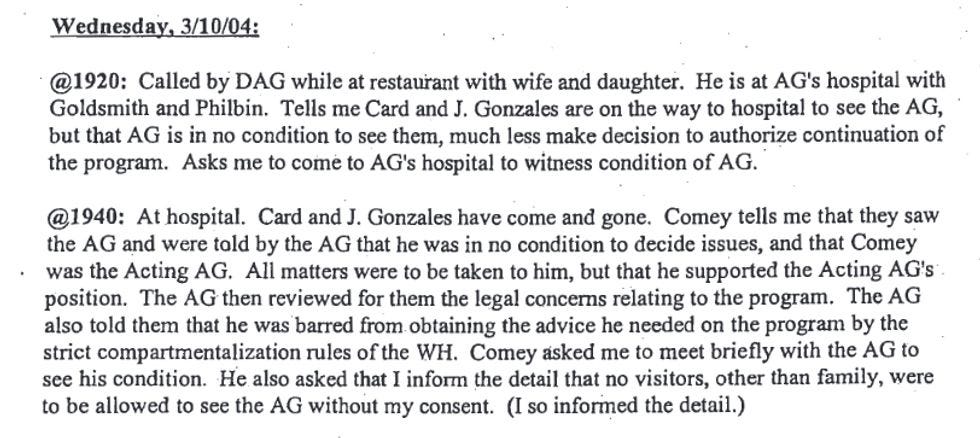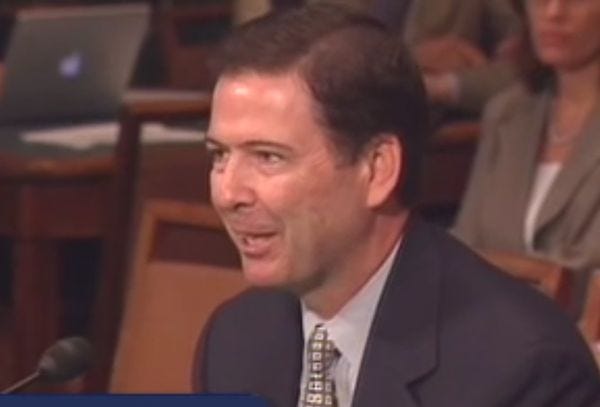That Time James Comey Kicked George W. Bush's Ass On Warrantless Spying
While it was big news to get the details of that February 14 memo James Comey wrote to document Donald Trump's request that he maybe just stop investigating that nice Mike Flynn, the fact that Comey kept a paper trail of all the stuff he thought was hinky about Trump's behavior shouldn't be surprising at all. Any good bureaucrat is familiar with the art of the CYA memo, and for a law enforcement guy like Comey, taking copious notes was just second nature. If only students in college classes would learn to take notes a tenth as well.
As former FBI assistant director Tom Fuentes told Politico, documenting conversations with higher-ups -- especially higher-ups who are under investigation -- is simply what FBI people do:
A conversation with a subject of an investigation is evidentiary, no matter what is discussed [...] Any conversation with Trump is going to be noteworthy....If you drop dead of a heart attack, your successor is going to want to know what was going on, so you would record that whether it’s to aid your future memory or for a successor two or three years down the line.
So let's take a look at a couple of great moments in Comey history, and the documentation thereof:
The Great Hospital Showdown
Ah, we remember it like it was yesterday... [wavy lines]
Actually, we had to look it up to refresh our memory, which is the whole point. But the nitty is, it was March 10, 2004, James Comey was the Deputy Attorney General, and the Justice Department had recently determined the Bush administration's warrantless domestic spying program was not legal and shouldn't be re-authorized. Comey was temporarily in charge at the DOJ because AG John Ashcroft was in intensive care at George Washington University after having his gallbladder removed in an emergency procedure. Comey had already refused to sign off on a 45-day re-authorization of the surveillance program. In one of those great moments of Bush administration stupid, White House Counsel Alberto Gonzales and Chief of Staff Andrew Card decided to head over to pay the barely awake Ashcroft a visit and also see if they could maybe get his signature on a re-authorization of the wiretap program. Ashcroft's chief of staff called Comey to tell him the Bush boys were on the way, so Comey had his driver turn on the lights and siren, and raced the Bush guys to the hospital, as he testified to the Senate Judiciary Committee in 2007:
I hung up the phone, immediately called my chief of staff, told him to get as many of my people as possible to the hospital immediately. I hung up, called [FBI] Director Mueller and — with whom I’d been discussing this particular matter and had been a great help to me over that week — and told him what was happening. He said, I’ll meet you at the hospital right now.
Told my security detail that I needed to get to George Washington Hospital immediately. They turned on the emergency equipment and drove very quickly to the hospital.
I got out of the car and ran up — literally ran up the stairs with my security detail.
CHUCK SCHUMER: What was your concern? You were in obviously a huge hurry.
COMEY: I was concerned that, given how ill I knew the attorney general was, that there might be an effort to ask him to overrule me when he was in no condition to do that.
Comey testified that once at the hospital, he went to Ashcroft's room and tried to figure out how lucid he was, and then got back on the phone with Mueller:
I immediately began speaking to him, trying to orient him as to time and place, and try to see if he could focus on what was happening, and it wasn’t clear to me that he could. He seemed pretty bad off. […]
I went out in the hallway. Spoke to Director Mueller by phone. He was on his way. I handed the phone to the head of the security detail and Director Mueller instructed the FBI agents present not to allow me to be removed from the room under any circumstances.
Gonzales and Card showed up and explained to Ashcroft that they'd really like his autograph on some surveillance papers that Comey wouldn't sign, and then Ashcroft had a surprise for everyone:
Attorney General Ashcroft then stunned me. He lifted his head off the pillow and in very strong terms expressed his view of the matter, rich in both substance and fact, which stunned me — drawn from the hour-long meeting we’d had a week earlier — and in very strong terms expressed himself, and then laid his head back down on the pillow, seemed spent, and said to them, "But that doesn’t matter, because I’m not the attorney general" … and he pointed to me, and I was just to his left.
The two men did not acknowledge me. They turned and walked from the room.
Comey added that after the confrontation, "I was very upset. I was angry. I thought I just witnessed an effort to take advantage of a very sick man, who did not have the powers of the attorney general because they had been transferred to me."
Now, as it turns out, FBI Director Robert Mueller was doing the whole note-taking thing himself, as his FBI log for March 10, 2004, indicates:

Fun, huh? And a fine example of why you want to Write It Down -- while our very lazy search didn't find any mention of Comey's own notes on the episode, you have to assume Comey wasn't spinning that story purely from memory. Here's video of that testimony; it's as jaw-dropping today as it was in 2007:
Torture Is Bad And Torturers Should Feel Bad
As Deputy Attorney General, Comey was not on board with the Bush administration's torture program, as was later discussed in detail in 2013 when Comey was nominated by Barack Obama to be FBI director. Comey testified at his confirmation hearings, "When I first learned about waterboarding, when I became deputy attorney general, my reaction as a citizen and a leader was: This is torture. It's still what I think."
He also had a paper trail to back that statement up, although as with all things Comey, the record isn't altogether flattering to him, either. While he objected to the use of torture, he did sign off on the DOJ's 2005 legal opinion authorizing the use of extreme interrogation techniques -- the alternative would presumably be to resign in protest, which he'd already threatened to do over the warrantless wiretapping program. But before signing off, Comey did everything he could to derail the use of "extreme interrogation" methods, as the New York Times detailed in 2009:
While signing off on the techniques, Mr. Comey in his e-mail provided a firsthand account of how he tried unsuccessfully to discourage use of the practices. He made a last-ditch effort to derail the interrogation program, urging Attorney General Alberto R. Gonzales to argue at a White House meeting in May 2005 that it was “wrong.”
“In stark terms I explained to him what this would look like some day and what it would mean for the president and the government,” Mr. Comey wrote in a May 31, 2005, e-mail message to his chief of staff, Chuck Rosenberg. He feared that a case could be made “that some of this stuff was simply awful.”
Comey wrote in another 2005 email that the Justice Department and then-Attorney General Gonzales would eventually come to regret rushing to authorize the interrogations:
“I told him the people who were applying pressure now would not be there when the [expletive] hit the fan,” Mr. Comey wrote in another e-mail message. “It would be Alberto Gonzales in the bull’s-eye. I told him it was my job to protect the department and the A.G. and that I could not agree to this because it was wrong. I told him it could be made right in a week, which was a blink of an eye, and that nobody would understand at a hearing three years from now why we didn’t take that week.”
Comey also recorded his willingness to go on record as the one who tried to block DOJ approval of the use of combined torture techniques:
Comey said he told Gonzales that he should tell the White House that Comey "had gone on record against this" and that he was willing to bear the brunt of the blame for blocking efforts to get the DOJ to authorize the torture program.
"I told [Gonzales] I was leaving and was perfectly willing to catch that spear, as I had in other contexts," Comey wrote Rosenberg in the April 28, 2005 email.
There's a lot more on Comey's objections to the torture program in this Truthout article; it makes clear that Comey was one of the few voices at Bush's DOJ willing to stand up to political pressure from the White House -- at one point during the internal arguments over torture, Comey even wrote to his chief of staff that he missed John Ashcroft, who had shown more "backbone" from his hospital bed than Alberto Gonzales did standing up:
People may think it strange to hear me say I miss John Ashcroft, but as intimidated as he could be by the [White House], when it came to crunch time, he stood up, even from an intensive care hospital bed. That backbone is gone
As the Russia investigation moves forward, we can expect more of Comey's memos on Trump to come forward, probably under subpoena. Based on his careful record keeping during the Bush years, they're likely to make for interesting reading, but not a very flattering portrait of government in the Trump months.
Yr Wonkette is supported by reader donations. Help feed our history addiction by clicking that "Donate" linky below!
[ Politico / WaPo / ThinkProgress / NYT / Truthout ]




Was I the only one reading pee hookers? Weird history in Studio 54 with famous gay Roy Cohn and his evil apprentices, like famous Roger Stone and his having an orgy coincidentally timed after the release of the Macron emails? General Flynn and the blond British-Russian at Cambridge who made the intelligence services "uneasy" and their "Moscow Mischa" cutesyness? The hacked texts of Manafort's family that claimed [REDACTED] had been bullied into participating in orgies?
https://www.youtube.com/wat...